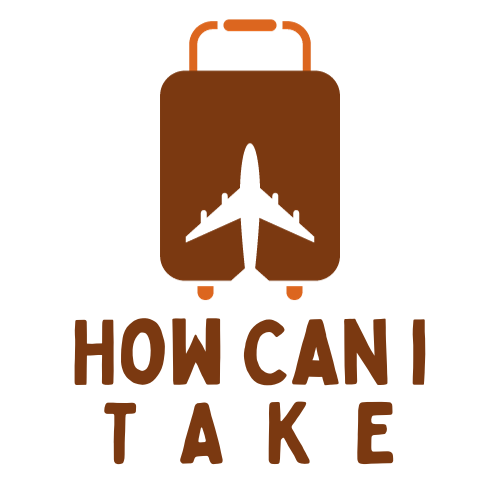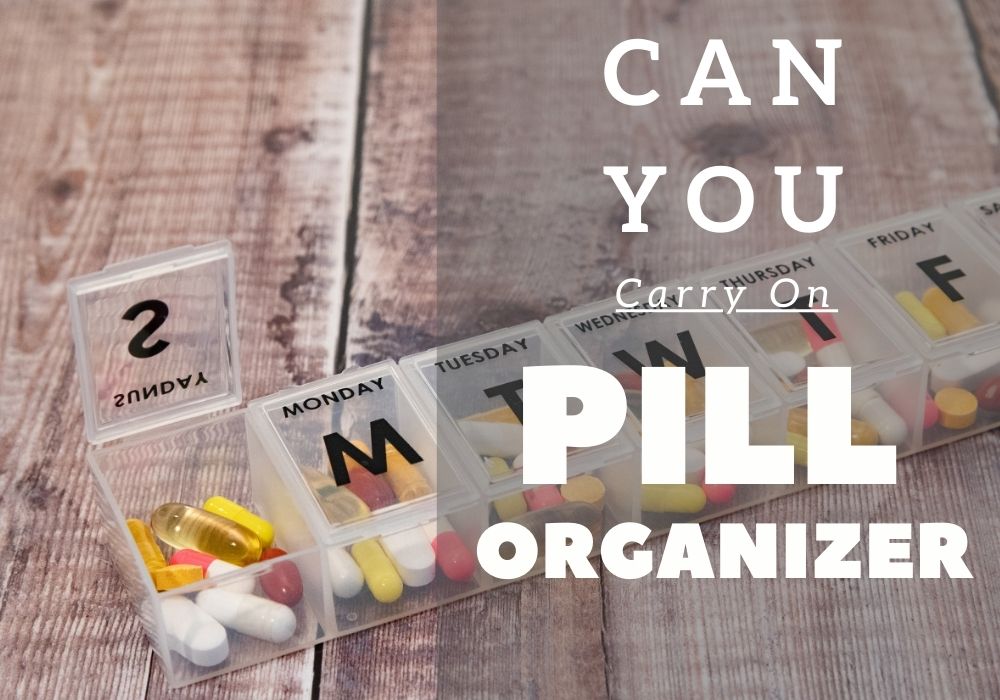Are you planning to travel soon and worried about carrying your pill organizer on the plane? The simple answer is yes, you can take a pill organizer on a plane. However, there are certain rules and regulations that you need to follow to avoid any inconvenience. In this blog Can You Carry On Pill Organizer? we will discuss in detail the TSA guidelines for carrying medication on planes, specific rules for carrying pill organizers, and how the type of medication influences travel restrictions.
We will also provide some handy tips for packing medication and important information regarding prescription medication on planes. So, whether you are traveling domestically or internationally, make sure to read this informative blog before packing your pills.
Table of Contents
Can You Carry On Pill Organizer? Yes or No
Yes, you can bring a pill organizer on a plane
Prescription medications, whether in pill or liquid form, are allowed on flights, but there are certain restrictions to be aware of. The TSA may request a visual inspection of your medication, pill box, or pill case for security reasons. It’s important to note that different countries may have different laws regarding the transportation of pill organizers, so it’s always a good idea to check local laws when traveling. When packing your pill organizer in your baggage or wallet, make sure to adhere to the TSA guidelines and place it in a clear plastic bag for easy inspection.
By following these guidelines and being aware of any specific rules, you can safely travel with your pill organizer and necessary medications.
Understanding Travel Regulations for Medications

When traveling, it’s important to understand the regulations regarding medications. The Transportation Security Administration (TSA) provides guidelines for traveling with medication, so it’s essential to familiarize yourself with them. Additionally, different countries may have their own laws and regulations when it comes to transporting medications. Be sure to follow local laws to avoid any issues while traveling with prescription medication.
To ensure a smooth process at security checkpoints, make sure your prescription medication is properly labeled and easily accessible for visual inspection. This includes pill organizers or cases. It’s also a good idea to carry the phone number of your healthcare provider in case of emergencies. By being aware of the travel regulations and complying with them, you can have peace of mind when carrying medication during your journey.
Overview of TSA Guidelines for Carrying Medication on Plane
TSA guidelines for carrying medication on a plane allow prescription medication in solid form, including pills and capsules. It’s important to note that liquid medication in amounts greater than 3.4 ounces must be declared to security administration. However, medications in liquid form, such as nitroglycerin tablets, are allowed in unlimited amounts. To ensure a smooth security inspection process, it is recommended to properly label your medication with a prescription bottle, pill box, or pill case. This labeling helps facilitate the security inspection and ensures compliance with TSA regulations.
Additionally, packing your medication in the top bag of your luggage allows for easy access at security checkpoints. By following these guidelines, you can carry your necessary medications with confidence while traveling.
Specific Rules for Carrying Pill Organizers on Flights
When traveling with pill organizers, such as pill boxes, it is important to be aware of specific rules and guidelines. While pill organizers are allowed on planes, it is advisable to keep them separate from your other belongings to facilitate security inspection. Proper labeling of the pill organizer, if possible, can help avoid any confusion during the security check.
Additionally, be prepared for security administration to request a visual inspection of the pill organizer, so make sure your medication is easily identifiable. If you are traveling internationally, it is crucial to check the local laws and regulations regarding the transportation of pill organizers. By following these guidelines, you can ensure a smooth and hassle-free travel experience with your medication.
How Does the Type of Medication Influence Travel Restrictions?

The type of medication can have an impact on travel restrictions. Controlled substances, like prescription painkillers, may have additional regulations. Illegal substances, such as marijuana or illegal possession of prescription medication, are strictly prohibited. Some medications, like liquid forms, may have different security requirements.
Always check with law enforcement, the TSA, or local laws for transportation guidelines. Remember to follow the laws and regulations of both your origin and destination countries.
Tips for Packing Medication
When traveling by plane, it’s important to pack medication in your carry-on bag to ensure easy access during the flight. To facilitate security inspection, keep prescription medication, pill organizers like pill boxes or pill cases, easily accessible. Make sure to use a sturdy, secure, and properly labeled pill organizer to avoid any confusion. If possible, carry prescription medication or pill boxes in their original packaging for security purposes. It’s also crucial to pack medication in a way that protects them from damage.
Remember, when packing your medication, consider the TSA guidelines for carrying medications on planes. By following these tips, you can ensure a hassle-free and smooth travel experience without any issues with your medication.
Prescription Medication on Planes
Prescription medication, in various forms such as pills, capsules, liquids, and solids, is allowed to be carried on planes. To ensure easy access, it is recommended to pack your prescription medication, along with your pill organizer, pill box, or pill case, in your top bag of luggage. It is also advisable to have your prescription medication properly labeled, if possible, for security inspection. When traveling with prescription medication, make sure to follow the guidelines provided by the security administration, as well as any local laws and regulations.
Additionally, it is a good idea to carry the phone number of your healthcare provider and any necessary medication prescriptions for security checks. By following these steps, you can ensure a smooth journey while keeping your medication with you at all times.
Liquid vs. Pill Medication Restrictions

Liquid and pill medication have different restrictions when it comes to air travel. While liquid medication, including nitroglycerin tablets, is allowed in unlimited amounts on planes, there are guidelines for carrying pill medication. Prescription medication in pill form, capsules, pill boxes, pill cases, or prescription bottles is allowed, but it is subject to security administration guidelines. For liquid medication, if the amount exceeds 3.4 ounces, it must be declared to security administration. It is important to follow local laws, transportation security administration regulations, and security administration guidelines for transporting liquid medication.
Properly labeling medication, pill boxes, pill cases, and prescription bottles is recommended to facilitate visual inspection. By adhering to these guidelines, travelers can ensure a smooth experience when carrying their medication while traveling.
Frequently Asked Questions
Do prescription pills have to be in original containers when flying?
Prescription pills do not have to be in their original containers when flying, according to TSA regulations. However, it is recommended to keep them in their original containers. If you transfer pills to a pill organizer, make sure the labels on the original containers are visible. Carry a copy of your prescription or doctor’s note for any medication that may raise questions.
Is it okay to put pills in pill organizer?
Yes, it is acceptable to store pills in a pill organizer. However, it is best to keep them in their original labeled containers if possible. If you’re traveling internationally, make sure to check the regulations of your destination country regarding medication and pill organizers. Additionally, ensure that liquid medications or gels are stored according to TSA guidelines.
Can you put prescription pills in a different container?
Yes, it is allowed to put prescription pills in a different container when traveling. Make sure to label the new container with the medication’s name and dosage information. It’s also advisable to carry a copy of your prescription or doctor’s note with you. Pill organizers are permitted, but they may undergo additional screening.
Is Your Seven-Day Pill Box Illegal?
No, a seven-day pill box is allowed on planes. You can bring pill organizers in both carry-on and checked luggage. It is advisable to pack medication in its original packaging with a prescription label. If you have any concerns, consult your healthcare provider or airline before traveling.
Pill Organizer for Prescription Meds in Carry-on Luggage?
Yes, you can bring a pill organizer with prescription medication in your carry-on bag. Remember to label your medication and carry a copy of your prescription. Keep the medication in its original packaging and separate from other items. Inform TSA if you have liquid medications exceeding 3.4 ounces or medical equipment.
Conclusion and final thoughts
It is essential to be informed about the rules and regulations regarding carrying medication on a plane, especially if you rely on a pill organizer. The Transportation Security Administration (TSA) allows passengers to bring medication in pill or solid form through security checkpoints, including pill organizers.
However, there are specific guidelines to follow, such as keeping the medication in its original packaging and declaring it at the security checkpoint. Additionally, liquid medications may have different restrictions, so it is advisable to check with the airline and TSA beforehand.
Ensuring you adhere to these guidelines will help make your travel experience smoother and stress-free.





Leave a Reply